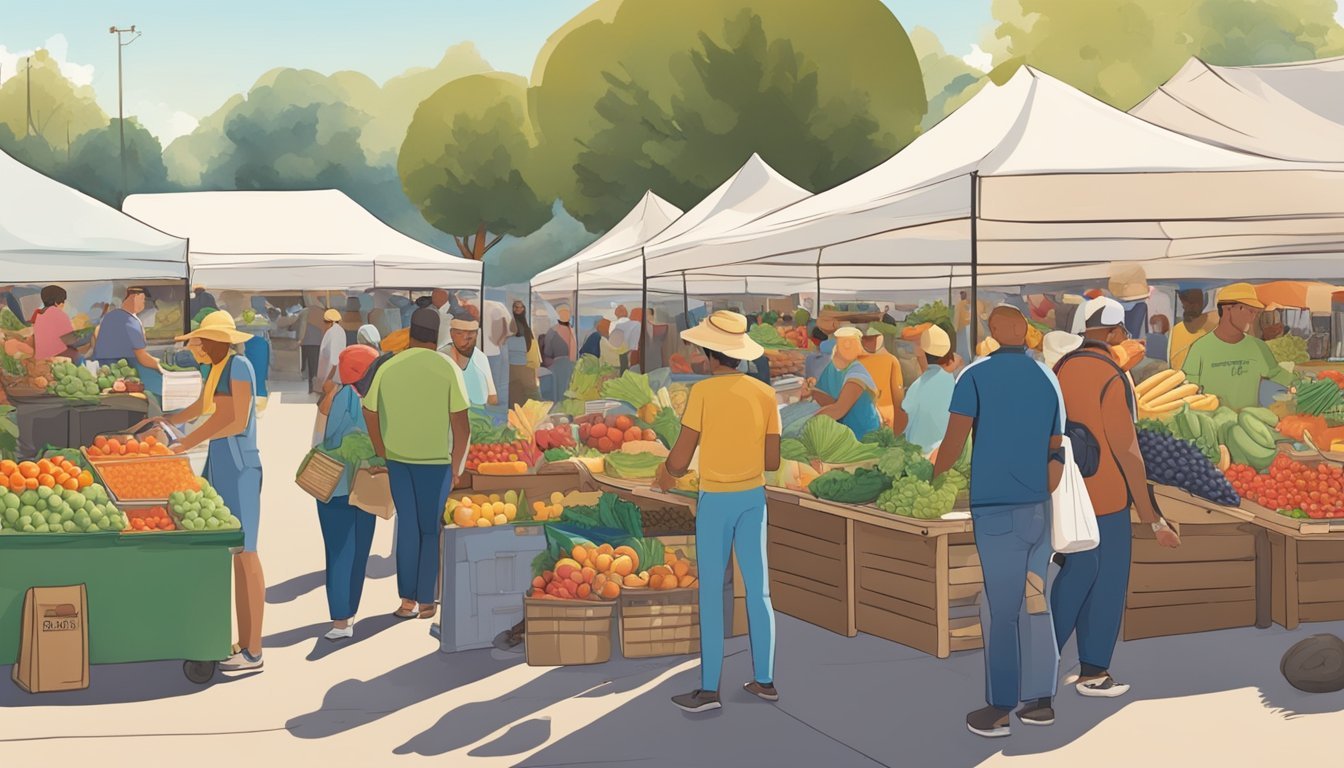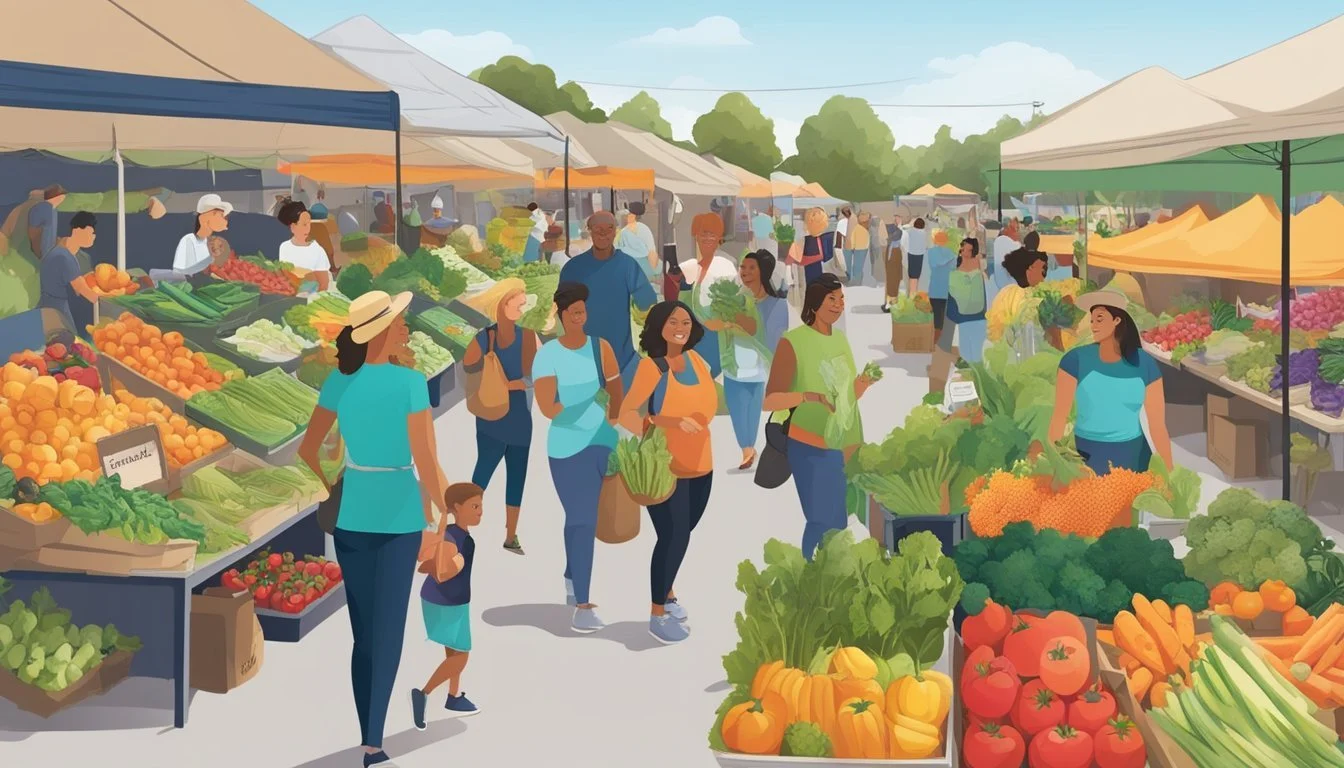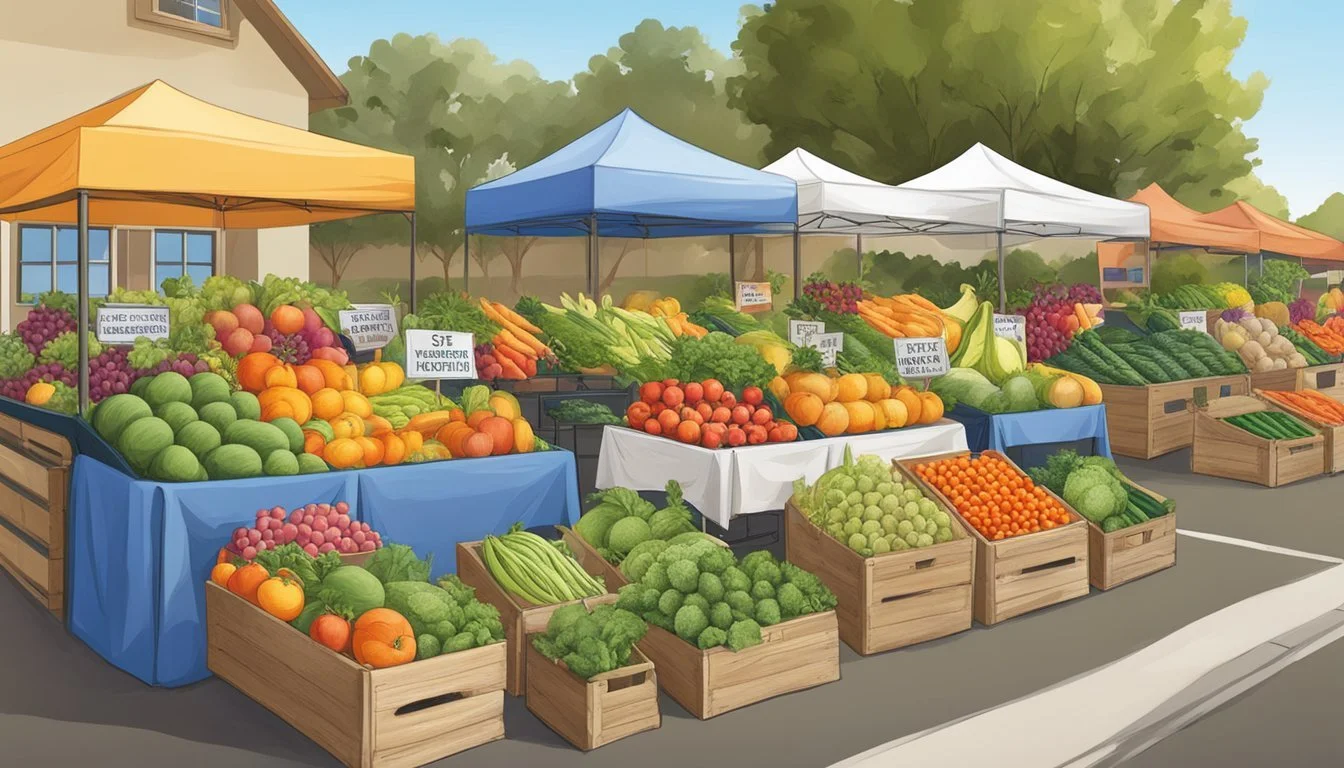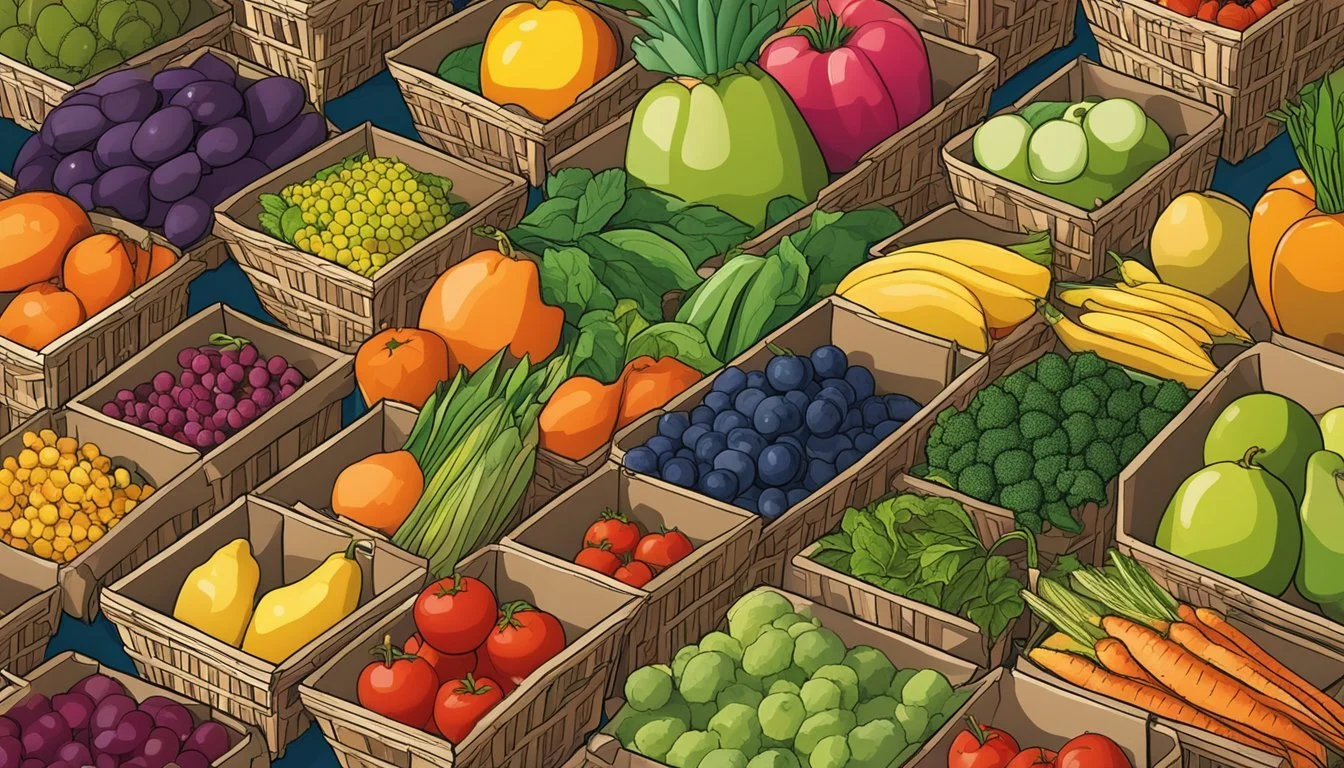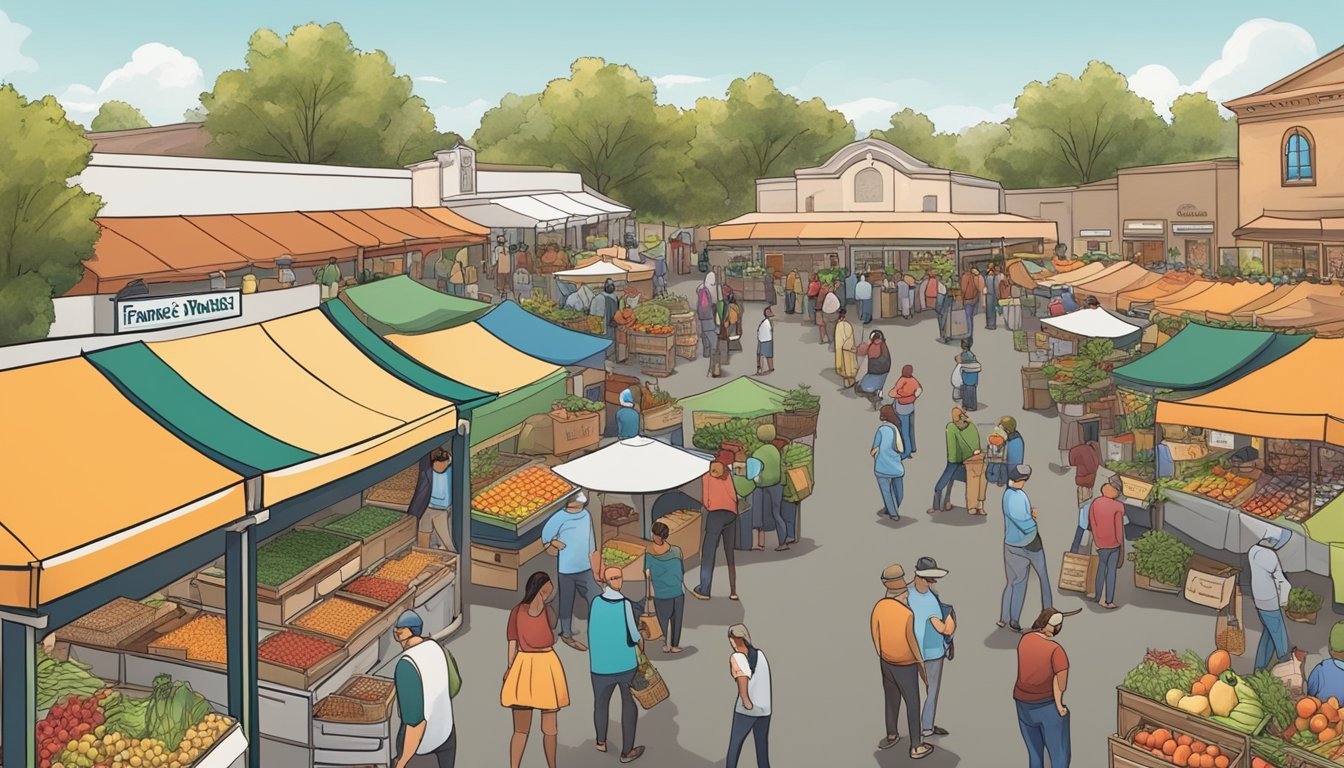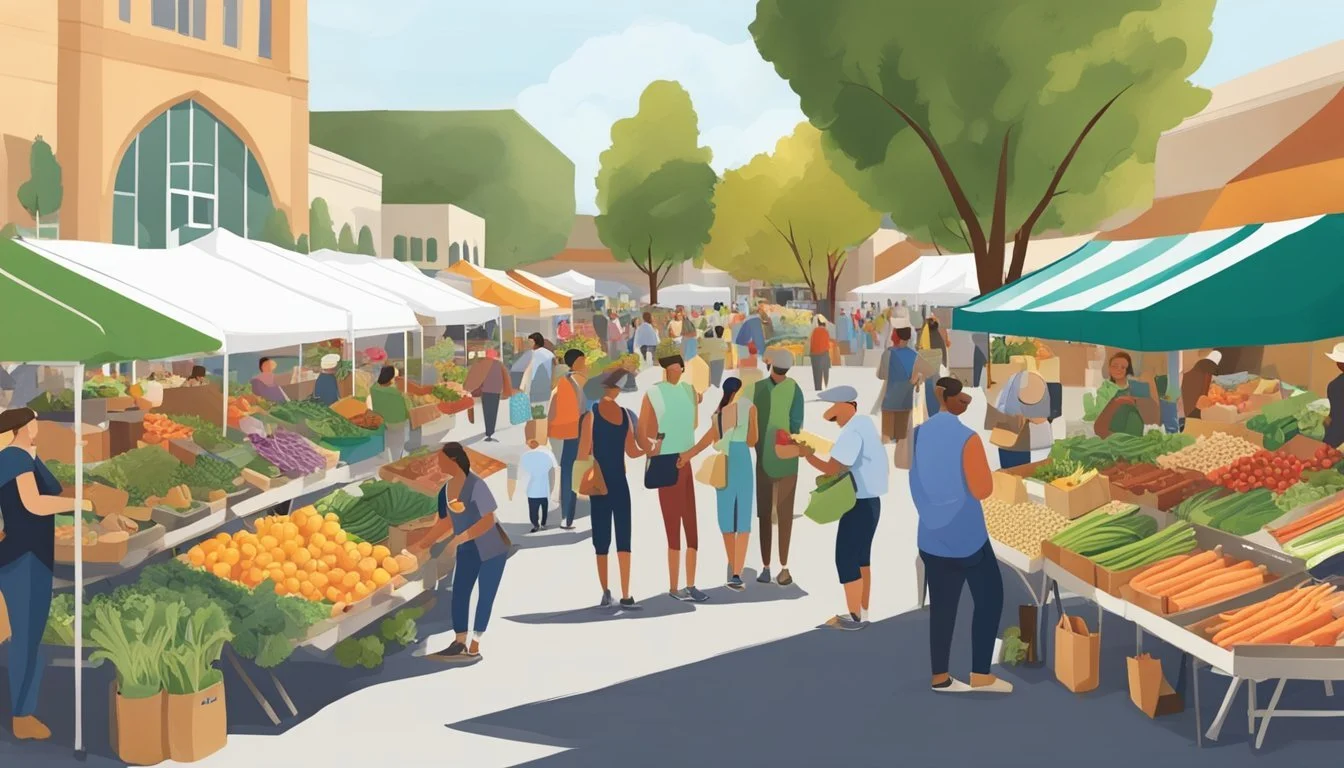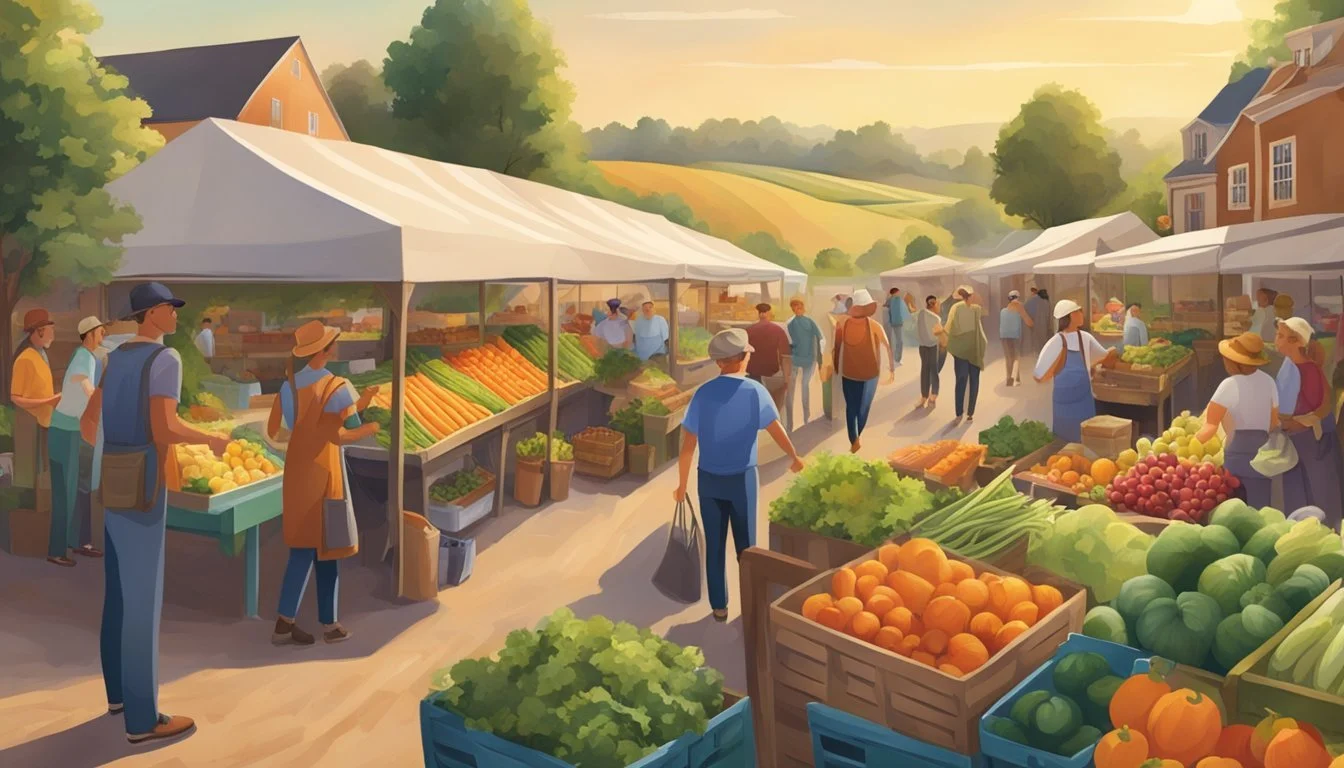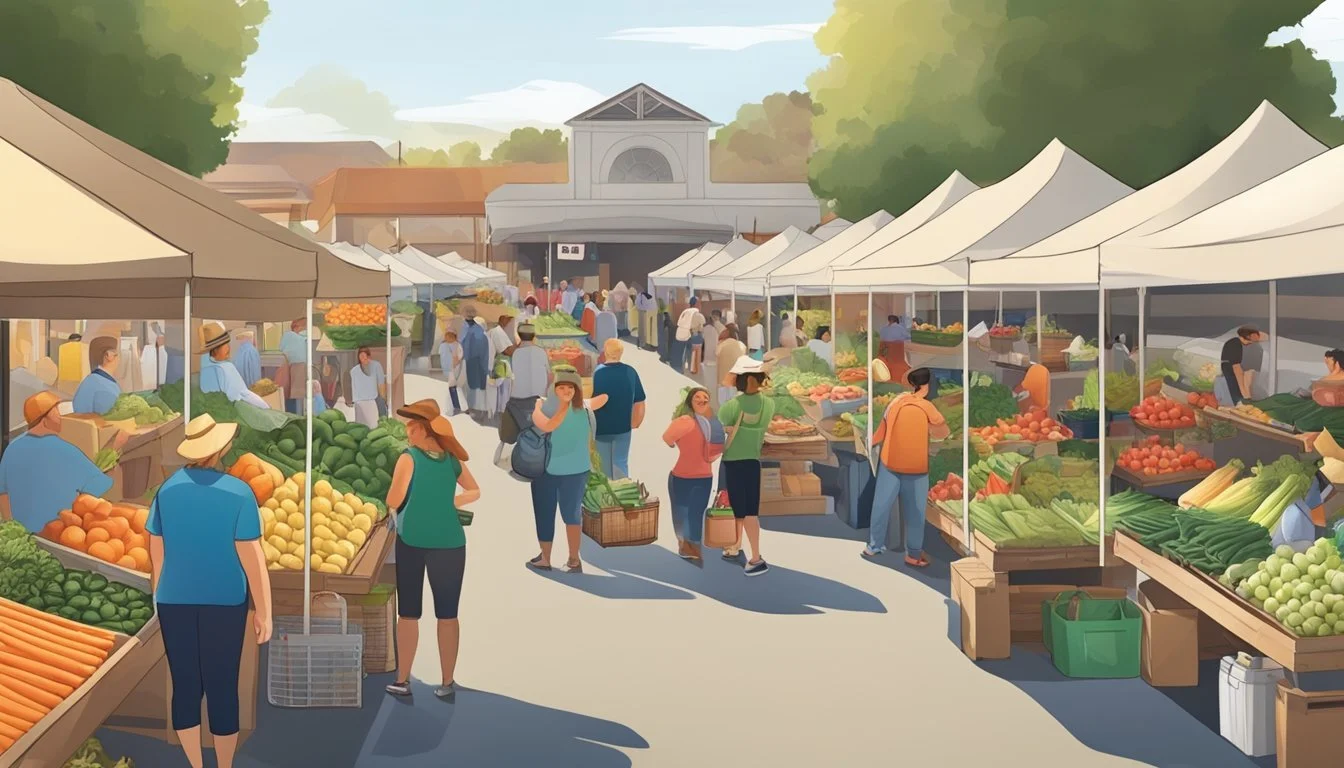Community Supported Agriculture (CSA) in Roseville, CA
A Guide to Local Farm Partnerships
Community Supported Agriculture, commonly known as CSA, has taken root in Roseville, CA, offering residents a chance to participate in a system that connects them directly to their food sources. CSA programs in the area allow individuals to purchase "shares" from local farms, which they receive periodically, usually in the form of a box of seasonal produce. This model benefits both the farmers, by providing them with upfront working capital, and consumers, by assuring them fresh, locally-grown food.
The success of the CSA model in this region reflects a growing trend towards sustainable farming practices and a robust local food economy. In Roseville, community members subscribing to CSA programs not only have access to fresh produce but also have the opportunity to support the local farming community. This symbiotic relationship fosters a closer link between consumers and food producers, enhancing the community's understanding of where their food comes from and the importance of agricultural stewardship.
CSAs in Roseville are part of a larger movement that emphasizes the value of community engagement and environmental responsibility. Participants of these programs often enjoy the benefits of eating healthily and seasonally while contributing to the food security and economic stability of their community. Moreover, the spread of CSA programs in the area signals a commitment to preserving agricultural land and promoting sustainable eating habits among residents.
Understanding Community Supported Agriculture (CSA)
Community Supported Agriculture, commonly known as CSA, is a model of food production and distribution that connects local farmers directly with consumers. Participants, or members, pay for a share of a farm's produce upfront, contributing to the farm's financial stability and in return receiving a portion of the harvest throughout the growing season.
History and Evolution of CSA
The concept of CSA began in Japan in the 1960s under the term "Teikei," translated roughly as "food with the farmer's face on it." It arrived in the United States in the 1980s and has since grown in popularity. As of 2020, thousands of farms in the U.S. have adopted the CSA model. CSA's roots are in building a community around local food systems, fostering a direct relationship between farmers and members which supports both the local economy and sustainable agriculture.
CSA Model Explained
At its core, CSA is a partnership between a farm and the community. Members invest in the farm by purchasing a share of the anticipated harvest. This is typically done at the beginning of the growing season, and the cost can range depending on the size and type of share. In return, members receive a weekly or bi-weekly box of fresh produce, often including vegetables, fruits, herbs, and sometimes additional farm products such as eggs or honey.
Types of CSA Shares:
Full Share: Suitable for a family or those with higher consumption
Half Share: Ideal for individuals or smaller households
Shares are distributed regularly throughout the season, and the variety depends on what is currently in season on the farm.
Benefits of Joining a CSA
Joining a CSA offers numerous benefits:
Health: Access to fresh, seasonal, and often organic produce that is nutrient-rich
Food System: Supports a more sustainable and equitable food system by reducing food miles and packaging waste
Local Economy: Direct financial support to local farmers and the local economy
Relationship: Fosters a deeper connection between consumers and their food, and between consumers and farmers
Members of a CSA often find that their relationship with food changes as they become more involved with where and how it is grown. They experience firsthand the seasonality of food and gain a better understanding of the challenges and rewards of farming.
CSA Membership and Subscription
Community Supported Agriculture (CSA) in Roseville offers a structure where members support local farms upfront, paving the way for consistent and sustainable produce throughout the season.
How Membership Works
Becoming a CSA member involves purchasing a share at the start of the growing season. This upfront investment solidifies a member's commitment to a local farm and secures them a portion of the harvest for the season. The season typically ranges from May to October. Members are then entitled to a weekly allotment of produce, experiencing the ebb and flow of farming through the variety and quantity of their shares.
Subscription Options and Payment
CSA offers various subscription options to cater to different needs. Members may select a suitable subscription size based on their household’s consumption needs. Full and half shares are common, allowing for flexibility. Payment plans vary, with some farms offering tiered fee structures that reflect the quantity and frequency of produce delivery. Payment is typically required before the start of the harvest season, providing farmers with essential funds for crop cultivation. Members often have the choice between one-time payments or installment plans.
Subscription Type Produce Quantity Payment Frequency Full Share Ample for family Single or Multiple Installments Half Share Suitable for individuals or couples Single or Multiple Installments
Seasonal Produce and Offerings
Community Supported Agriculture (CSA) in Roseville, CA, provides a connectivity between residents and local farmers where members can receive fresh, organic, and seasonal produce throughout the year. Subscribers can indulge in pesticide-free harvests including a variety of vegetables, fruits, and occasionally other farm products.
What to Expect Throughout the Seasons
Spring: CSA participants can expect an array of leafy greens such as spinach and lettuce, alongside root vegetables like radishes and carrots. These early crops thrive in the cooler start of the growing season.
Summer: The warmer months bring a bounty of tomatoes, peppers, stone fruits, and berries. During this peak season, the variety expands significantly.
Autumn: Harvests shift to include hearty produce like squash, pumpkins, and apples. The transition to cooler weather influences the types of vegetables and fruits available.
Winter: While the selection is more limited, members can still enjoy root vegetables and winter greens, which are capable of withstanding colder temperatures.
Benefits of Seasonal Produce
Nutritional Value: Seasonal fruits and vegetables are picked at the peak of their ripeness, providing maximum nutrient density and flavor. Organic practices further enhance their health benefits.
Ecosystem Support: Choosing seasonal, pesticide-free produce supports local ecosystems and biodiversity. This practice reduces the reliance on synthetic interventions, thus promoting a healthier environment.
In Roseville, CA, CSA programs not only offer a constant supply of fresh produce but also strengthen the bond between consumers and farmers. They ensure that the community has access to diverse, seasonal selections while also contributing to a sustainable future.
CSA Farms in Roseville, CA
Community Supported Agriculture (CSA) in Roseville, CA offers residents an opportunity to invest in local, sustainable farming. Members purchase shares, receiving a portion of the farm's harvest throughout the season.
Local CSA Farm Profiles
Roseville's CSA landscape includes a number of farms that prioritize organic farming and sustainable practices. For example, CSAware has emerged as a leading CSA management platform in the area, also advocating for online EBT to support members on SNAP benefits. Another notable CSA provider is the Community Alliance with Family Farmers, framing CSA as an investment in health and community, offering regular deliveries of seasonal goods to its members.
CSAware: Known for its CSA management software, it is a significant force in connecting consumers with local farms that use ecological farming methods.
Community Alliance with Family Farmers: This alliance offers shares that promise regular deliveries, echoing a commitment to community health and land stewardship.
Land and Farming Practices
The farmland surrounding Roseville is utilized with a focus on sustainable agriculture and often incorporates principles of biodynamics. Farms in the region are dedicated to the ethical treatment of animals and the responsible stewardship of the land.
Barbell Farm in nearby Elk Grove: While not in Roseville itself, it adheres to high standards of ethical and local farming, raising non-GMO fed chickens on pasture.
Farms engaged in the CSA model typically ensure that their land is used in ways that promote organic practices, often going beyond the avoidance of synthetic pesticides to embracing holistic farm system health. These practices are designed to maintain soil fertility and ecosystem balance, securing the land’s productivity for future generations.
Building Community and Economy
Community Supported Agriculture (CSA) in Roseville, CA, represents a vital bridge between residents and local farmers, strengthening the local economy while fostering a sense of community responsibility and engagement.
Supporting Local Economy and Farmers
Roseville's CSA initiatives directly bolster the local economy and sustain farmers. Shareholders' investments allow farmers to plan their crops with assurance, knowing they have a guaranteed market for their products. This financial stability translates into economic resilience for the area. It ensures that a larger portion of the community's food dollars stay within the local ecosystem, contributing to the vibrancy of Roseville's economy.
Investment in Local Agriculture:
Shareholders pre-purchase shares of the harvest.
Farms gain upfront capital, reducing financial risk.
Economic Impact:
Money circulates within the local economy.
Job creation and support for ancillary services.
Community Engagement and Shared Responsibility
CSA in Roseville isn’t merely a transaction; it’s a partnership. Shareholders and farmers undertake a shared responsibility in the success of the local food systems. Community members become integral in supporting agriculture by sharing in the risks and bounties of farming. In return, they receive fresh, locally-grown produce, strengthening their relationship with the food they consume.
Regular delivery of a box of seasonal goods.
Participation in farm-related events and volunteer opportunities.
Benefits of Shared Responsibility:
Improved understanding of the agricultural process.
Enhanced commitment to local food systems and sustainability.
Health and Nutrition
Community Supported Agriculture (CSA) in Roseville, CA provides members with access to fresh, seasonal produce that supports health and nutrition. Participation in CSAs has been associated with an increase in household stocks of fruits and vegetables and higher consumption of these nutritious foods.
Nutritional Benefits of CSA Produce
CSA members receive a diverse array of fresh fruits and vegetables which are often harvested at their peak nutritional value. Seasonal produce tends to be richer in vitamins and minerals compared to off-season counterparts. For example:
Vitamin C: Abundant in fresh strawberries and oranges available in spring CSAs.
Iron: High in spinach and kale from fall harvests.
The community benefits from this arrangement, as the shared responsibility and risks lead to strengthened community relationships and a direct investment in local health and nutrition.
Organic Food and Health
Many CSAs in Roseville offer organic food, which may reduce consumers’ exposure to synthetic pesticides and fertilizers. Organic farming practices are designed to promote soil and water conservation and reduce pollution. People who opt for organic produce through their CSA membership are supporting these practices, which may have the following health implications:
Reduction in pesticides: Eating organic foods may decrease the ingestion of pesticide residues.
Fresher produce: Organic produce in CSAs is often fresher as it does not contain preservatives that extend shelf life, potentially retaining more nutrients.
The choice of organic produce caters to a growing desire for foods that support personal and environmental health. Through CSA, members contribute to the sustainability of their community and the availability of nutritious, organic options.
Logistics and Accessibility
When exploring Community Supported Agriculture (CSA) in Roseville, CA, two pivotal elements come into play: how members receive their shares and the inclusiveness of the program for all income levels.
Pickup Locations and Delivery
Pickup Locations: CSAs in Roseville, CA, are renowned for their structured pickup systems. Members can collect their weekly shares at designated pickup locations that often include farmers' markets, local businesses, or directly at the farm. A list can typically be found on their websites or local food directories. The schedule is consistent, with most pickups occurring on the weekend to accommodate work schedules.
Delivery Options: Some CSAs offer delivery options for an additional fee. This convenient service provides flexibility for members who may not be able to reach the usual pickup points. Delivery schedules are generally fixed and communicated well in advance, ensuring members know when to expect their fresh produce.
CSA Accessibility and SNAP Participation
CSA Accessibility: Roseville CSAs aim to ensure their food is accessible to the entire community. To support this, some have partnered with local organizations to provide subsidized shares, thereby enhancing food accessibility.
SNAP Participation: In an effort to support low-income families, some Roseville CSA programs accept payments from the Supplemental Nutrition Assistance Program (SNAP). This initiative facilitates the purchase of healthy, local foods, expanding the market and promoting community health. CSA managers keep the process discreet, honoring the privacy of participating individuals.
Engagement and Communication
Effective engagement and communication are pivotal in strengthening the bond between members and the Community Supported Agriculture (CSA) program in Roseville, CA. Efficient updates and collaborative events are the cornerstones that foster a vibrant community and ensure active participation.
Member Communication and Updates
CSA members receive regular updates that keep them informed about the produce selection for the week, changes in delivery schedules, and other essential information. These updates are often communicated via:
Email Newsletters: A weekly summary of farm news, including harvest plans.
CSA Member Portal: Provides direct access to account details and an API integration that notifies members about updates or changes.
Farm Events and Volunteer Opportunities
Members of the CSA have the chance to engage more deeply with the farm through scheduled events and opportunities to volunteer. The calendar includes:
Farmers Market Meetups: Members can meet and connect with local farmers, enhancing their network within the agricultural community.
On-farm Events: Planned activities such as potlucks or harvest festivals where members participate and experience farm life.
Volunteer Programs: Invitations for members to contribute their time in various farm activities, fostering community spirit.
Marketing and Business Operations
In Roseville, CA, Community Supported Agriculture (CSA) business operations focus on innovative marketing strategies and cultivating strong customer relationships to sustain growth and retention.
Marketing Strategies for CSA
CSAs in Roseville employ a variety of marketing strategies to attract and engage community members. Farm-to-consumer sales are pivotal, so they emphasize the freshness and quality of their produce in marketing materials. Social media campaigns play a crucial role in highlighting seasonal offerings and providing updates. They often utilize platforms within the CSA Innovation Network to share best practices and new marketing techniques.
Local associations and business networks also contribute to CSA marketing by providing platforms for promotion and collaboration, increasing visibility within the community. CSAs may offer farm tours or participate in local events to directly connect with potential customers, an effective tactic that marries marketing with community engagement.
Customer Relationships and Retention
Building and maintaining customer relationships is key for the success of any CSA. They prioritize communication, often through regular newsletters or emails that not only inform customers about the produce they receive but also share stories from the farm, enhancing personal connections.
Retention strategies include:
Flexible subscription models, allowing customers to choose different levels of commitment.
Opportunities for feedback, ensuring that customers feel heard and valued.
Loyalty rewards or incentives for long-term members or those who refer new customers.
Furthermore, CSAs in Roseville stay connected to their base by being active within the CSA Innovation Network and local business associations, helping them stay informed about customer needs and emerging trends in sustainable agriculture. Their operations mirror the shared ethos of providing quality produce directly to consumers while fostering a sense of community through personal interactions.
Environmental Impact
Community Supported Agriculture (CSA) in Roseville, CA has significantly tangible benefits on the environment. Primarily, it reduces the carbon footprint associated with large-scale agriculture and enhances food sovereignty and security within the region.
Reducing Carbon Footprint with CSA
Local CSAs actively lower carbon emissions by minimizing the distance food travels from farm to consumer, thereby cutting down on transportation fuel use. Direct interactions between producers and consumers in the CSA model eliminate the need for long supply chains, which traditionally contribute heavily to greenhouse gas emissions.
Reduction Metrics:
Food Miles: Drastically reduced by sourcing food locally.
Packaging: Simplified and decreased, producing less waste.
Farm practices often include organic methods, which emphasize soil health, potentially sequestering carbon and mitigating climate change. Such sustainable practices are integral to the CSA model and support Roseville's environmental stewardship goals.
Food Sovereignty and Security
The CSA model directly contributes to food sovereignty by granting consumers a role in selecting and supporting their food sources. In Roseville, this empowerment is twofold: it ensures a market for local farmers and provides residents with access to fresh, wholesome produce.
Local Impact:
Availability: Improved access to nutritious foods year-round.
Resilience: Enhanced local agricultural resilience against market and environmental fluctuations.
By bolstering local food systems, CSAs ensure food security, reducing reliance on imported goods and buffering against global supply chain disruptions. This local self-reliance has profound implications for both environmental sustainability and community well-being.
Questions and Tips
When considering becoming part of a CSA program in Roseville, CA, individuals often have inquiries about the process and look for advice to make the most of their membership. The following subsections aim to address those common questions and provide helpful tips to new CSA members.
Frequently Asked Questions
What is a CSA share and how does it work?
A CSA share typically refers to a portion of a local farm's harvest that a consumer can purchase. Membership in a CSA involves a regular delivery of seasonally available produce, often weekly.Can I customize my CSA box?
Customizable options depend on the CSA program. Some offer a "farmer choice" box with a pre-selected assortment of items, while others may allow for some degree of personalization, albeit possibly at a higher administrative cost.What should I know about shared risk?
Members share in the risk of farming, meaning that produce availability might vary due to weather and other factors. It's important for consumers to understand and accept this aspect of a CSA model.Is all the food grown on the farm?
Most CSAs provide food grown on their farm, but some might include items from other local sources. If the origin of the food is important, members should inquire about this and ask for organic certification if that is a preference.
Tips for New CSA Members
Understand the commitment: Before joining, be aware that a CSA involves a season-long commitment, and the quantity of food received might change from week to week depending on harvest yields.
Be prepared for variety: Cooking with CSA produce encourages exploring new recipes and cooking methods. It's beneficial to have a flexible approach to meal planning.
Pick-up logistics: Choose a pick-up location that is convenient. Some CSAs also offer home delivery options which might suit some consumers better.
Support through SNAP: Certain CSAs in Roseville, CA support online EBT. Consumers depending on SNAP benefits should reach out to their chosen CSA to avail themselves of these options.
Get to know your farmer: Establishing a relationship with the farm can enhance the CSA experience. Some farms encourage visits or volunteer opportunities for a more hands-on connection.
By considering these questions and tips, individuals can make informed decisions about joining a CSA program and enjoy a more satisfying experience as a member of the local agriculture community.
Research and Data
Community Supported Agriculture in Roseville operates on data- and research-driven models that benefit local food systems and provide consumers with fresh farm products.
Studies on CSA Models and Outcomes
Research on CSA models emphasizes the direct-to-consumer distribution system that pairs local farmers with consumers. Consumers typically pay in advance for a season's worth of agricultural produce, creating a financial foundation that allows farms to operate sustainably. Outcomes of these studies often reflect a positive impact on ecological and social functioning within food systems.
Economic Stability: CSA models contribute to the economic resilience of local farmers by ensuring a stable market for their produce.
Community Engagement: They foster close relationships between producers and consumers, which enhances community engagement in local food systems.
CSA Data Analysis
Data collected from various CSAs reveal crucial insights into the efficiencies of these agriculture systems. Studies note that consumers enjoy the connection with their food source and that continued membership may be influenced by several factors.
Demographics and Membership Continuity: Detailed data reviews find associations between consumer demographics and membership retention.
Farm Management and Sustainability: Analyses on farm management practices suggest that certain management characteristics can significantly affect the financial and ecological sustainability of CSA ventures.
CSA Member Comparison Data (Snapshot):
Demographic Factor Current Members Former Members Household Size Larger Smaller Income Level Higher Lower Enjoyment of Food Prep High Moderate Accessibility to CSA Easy Challenging
Table format adapted from provided search results.
Studies and data combined elucidate how CSA models are implemented and sustained. They also pinpoint key variables instrumental in member satisfaction and involvement, essential for CSA continuance and growth.

